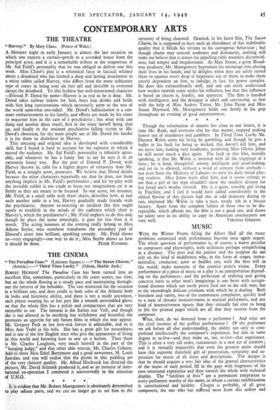CONTEMPORARY ARTS
THE THEATRE
" Harvey." By Mary Chase. (Prince of Wales.) A MONDAY night in early January is almost the last occasion on which one expects a curtain-speech to a crowded house from the principal actor, and it is a remarkable tribute to the magnetism of Mr. Sid Field's personality that he was obliged to deliver one this week. Miss Chase's play is a whimsical farce or farcical whimsy about a drunkard who has formed a deep and lasting attachment to a white rabbit called Harvey, who differs from the more sublunary type of coney in being over six feet tall and invisible to everyone except the drunkard. To this feckless but well-intentioned character —Elwood P. Dowd by name—Harvey is as real as he is dear. Mr. Dowd takes railway tickets for him, buys him drinks and holds with him long conversations which necessarily seem to the rest of the world somewhat one-sided. Mr. Dowd's hallucination is a con- stant embarrassment to his family, and efforts are made by his sister to sequester him in the care of a psychiatrist ; but what with one thing and another these result, first in the sister herself being shut up, and finally in the eminent psychiatrist falling victim to Mr. Dowd's obsession, for the more people see of Mr. Dowd the harder it is for them to disbelieve in Harvey.
This amusing and original idea is developed with considerable skill, but I found it hard to account for the raptures to which it moved the audience. Mr. Sid Field's personality is infinitely agree- able, and whenever he has a funny line to say he says it in an extremely funny way. But the part of Elwood P. Dowd, with Harvey thrown in, calls for a higher degree of virtuosity than Mr. Field, as a straight actor, possesses. We believe that Dowd drinks because the other characters repeatedly say that he does, not from anything implicit in Mr. Field's performance ; and his by-play with the invisible rabbit is too crude to focus our imaginations on it as firmly as they are meant to be focused. In one scene, for instance, Mr. Field, at a small table with three chairs, describes how, at just such another table in a bar, Harvey gradually made friends with the psychiatrist. Anyone re-enacting an incident like this ought surely to establish in the minds of the audience which chair is Harvey's, which the psychiatrist's ; Mr. Field neglects to do this and, though he plays the scene amusingly, it goes for less than it is worth. The acting honours of the evening really belong to Miss Athene Seyler, who somehow transforms the secondary part of Elwood's sister into brilliant, sparkling comedy. Mr. Field shows us—very engagingly—one way to do it ; Miss Seyler shows us how


































 Previous page
Previous page